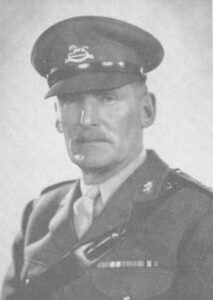Douglas Winchester Scott, who died on 10 April 1984, was born in 1907, the son of Admiral Sir Percy Scott the founder of the modern Naval Gunnery.

He was educated at Harrow and Sandhurst, succeeded his father in 1924 and joined the 3rd Hussars in Egypt in the Spring of 1927, shortly before the move to India.
He was on the Staff of the 1st Armoured Division at the outbreak of war, followed by a period on the Directing Staff of the Staff College, after which he returned to the Regiment in 1943 to take command of ‘C’ Squadron. Shortly after arrival in Italy, he became Second in Command to Peter Farquhar and on occasion commanded the Regiment in action when Peter was wounded.
In battle, he showed the same imperturbability, good humour, and readiness to have a go which characterised his career. In September 1944 he assumed command.
The first part of the year in which he commanded the 3rd Hussars was spent waiting in billets behind the lines for the 8th Army to break through into the Po Valley. Early in December, those remaining members of the Regiment who had sailed from England in 1940 were sent home, which involved a major
reorganisation. Consequently, the Regiment was sent back to the Middle East, so missing the final victorious advance into Austria.
The move also meant a change of equipment and role from tanks to Armoured Cars.
Shortly after the VE Day celebrations, a little-known war broke out in Lebanon and Syria between the French and Syrians.
The 3rd Hussars were ordered to keep the peace. Roughly this meant being shot at by both sides sometimes literally. A situation which could have developed into a very nasty bloodbath was kept under control by firmness and fairness under his leadership.
During his year in command, there was a constant changeover of Officers, NCO’s and Men and frequent changes in equipment and role. It says much for Douglas’ devotion to the Regiment, his example and his leadership that morale and efficiency remained high during this time of instability.
In 1949 he was selected to command the 9th Lancers and won their affection and respect. After retirement, he farmed in Oxfordshire before moving to Sussex.
In 1955 he was appointed as Colonel of the 3rd Hussars. His first responsibility was the negotiation of Regimental Battle Honours, the next the visit of HRH Princess Margaret, newly appointed as Colonel in Chief, and, finally, of course, the amalgamation.
From 1962-65 he was Colonel of the Queen’s Own Hussars and many still serving will remember the great interest he took in all aspects of Regimental life.
He was a keen and capable shot, with both rifle and gun and an expert and very knowledgeable fisherman. His readiness to have a light-hearted gamble was not always equalled by his judgement, but the cheerfulness with which he lost was only matched by his enthusiasm to have another go – which sometimes came off.
We will miss his companionship, enthusiasm and cheerfulness and the Regiment has lost a devoted and loyal member.


